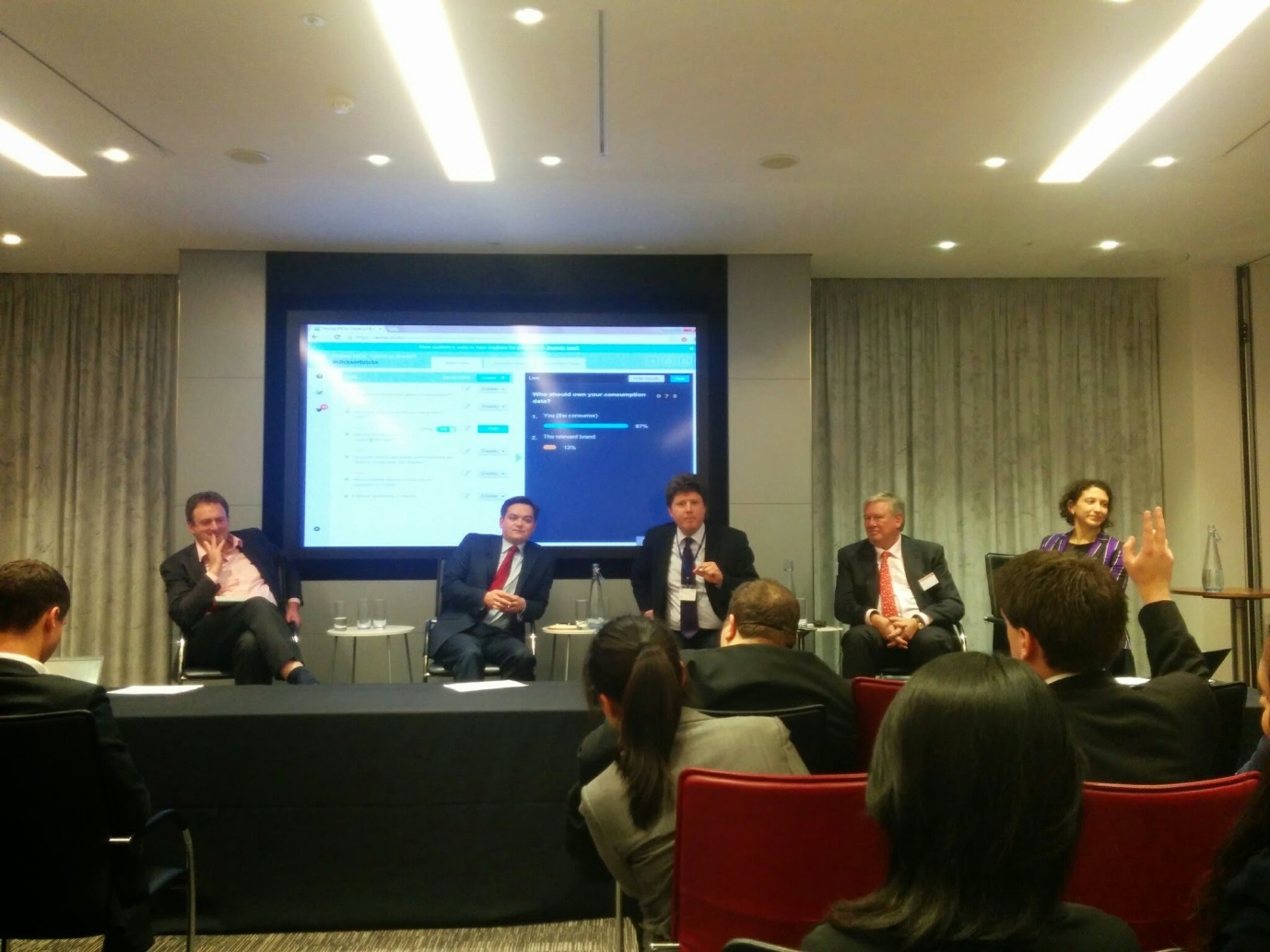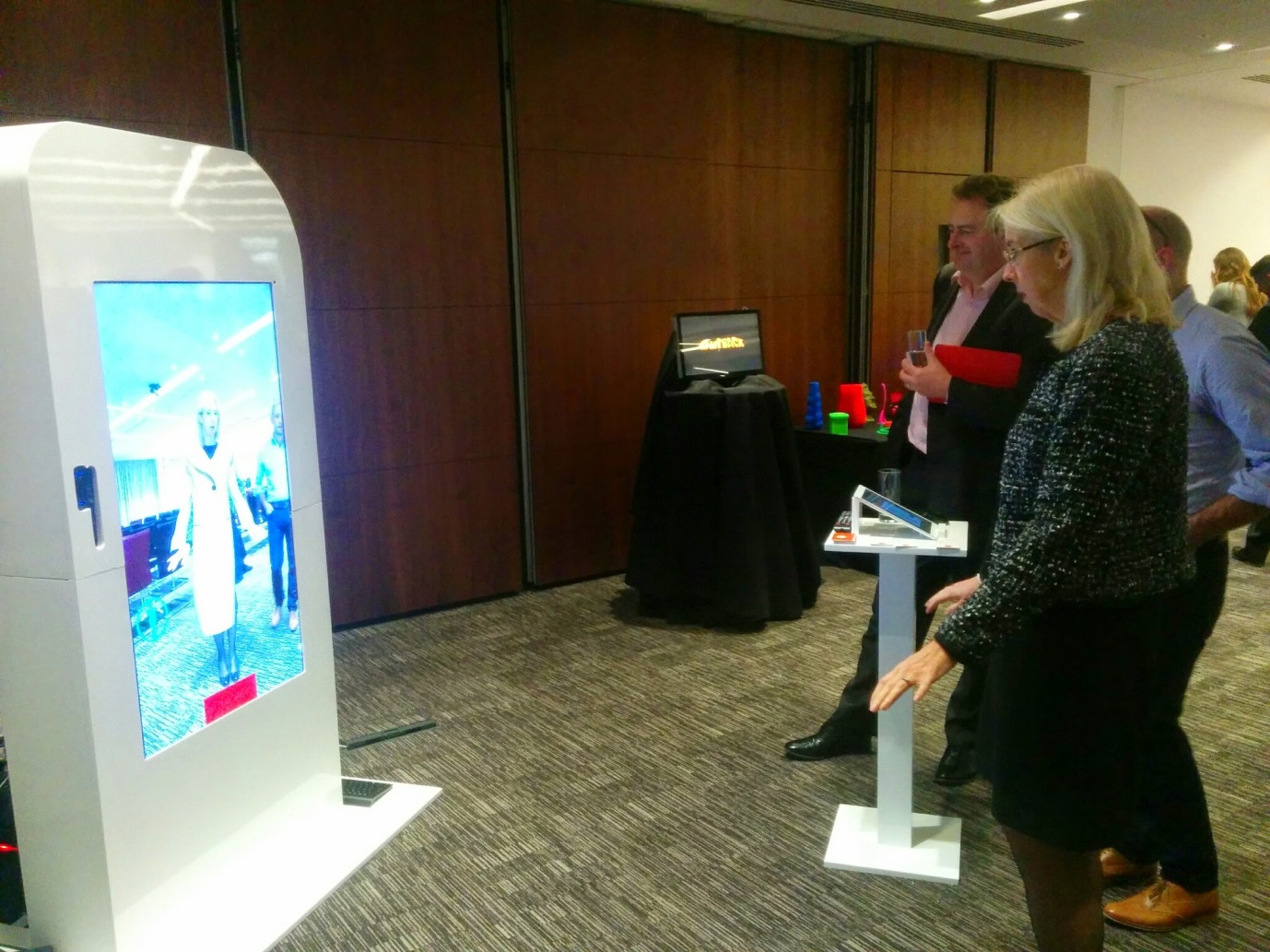Matthew Tod, Retail & Consumer Partner (PwC) and Claire Stokes, MCA Board Member (PwC) trying out Fashion3D by Space3D.
As part of the MCA’s Year of Digital, on Monday 8th December, PwC hosted a Young MCA Panel event titled “Retail – Clicks or Bricks?”. Approximately 200 consultants attended to hear the opinions of the four expert panellists. The session was chaired by Paul Connolly, MCA Think Tank Director.
Unlike previous Young MCA events, we decided to do things a bit differently. We showcased a series of demos that aim to change the retail world. Attendees had a chance to try out technologies from Space 3D, Inition, MakerBot, HOLO and Leap Motion.
Before the panel discussion kicked off, we were welcomed by MCA Board member and Senior Partner, Claire Stokes (PwC), who introduced us to our panel guests: Matthew Tod (Head of the Customer Practice at PwC), Richard Lim (Head of Business Information Services at the British Retail Consortium), John Miles (CEO of Space 3D) and Janaina Roque (Director at Integration Consulting).
The panel gave their views on the main trends in the market, looking particularly at the challenges retailers face as a consequence of the changes in consumption habits:
- A new model for consumption is emerging – consumers are now using online and offline simultaneously: the “BIMBO” approach (Browsing in store on mobile, buying online). This may not signal an end to the perceived war between the high street and Digital. But it shows how shopping is being continually reinvented.
- This reinvention is driving lots of activity in the retail sector, including relentless Digitisation.
- But while this activity is good for Digital specialists and advisers, it does not necessarily mean that all retail is profitable. Relentless discounting is good for consumers. Panellists expected a busy Christmas for retailers. But the very low and even loss-making margins may not be a sustainable model for retail
- Given the current trends in the market, retailers must choose between being cheap, being convenient or providing a quality customer experience. Non-food retailers are tending towards providing the last. Food and grocery discounters are excellent at being cheap. This pushes traditional grocery retailers, who struggle to offer excitement in the process of buying of toilet rolls, towards convenience.
- Click and collect is on the rise at the moment as a model for convenience. However, this may prove simply a temporary solution while retailers get their delivery operations up to speed. Quick, customised delivery will be the game-changers of the future.
The fluidity between online and offline creates complex dynamics around issues of customer loyalty. Customers are able in theory to choose freely from a huge range of purchase options using an unprecedented wealth of information. Brands by contrast will deploy information about customer preferences to entice them and even make them offers of discounted services, trying to tie them into loyalty in exchange for even more data.

Panel (L-R): Matthew Tod, PwC; Richard Lim, British Retail Consortium; Paul Connolly, MCA (chair); John Miles, Space3D; Janaina Roque, Integration.
The panel debated the issues around “Big Data” at some length. Increasingly, citizens and legislators are concerned that retailers have gained undue control over data assets that should properly belong to citizens. The audience showed great interest in this topic, both when asking questions directly to the panel and when using the “Sli.do” facility. 87% of attendees voted that individual consumers should own their personal consumption data rather than brands. The panel expressed the view that:
- Many retailers are still unable to really make good use of the data that they collect.
- While it is true that retailers should be “ethical” with the data they collect, data can be a huge revenue stream for retailers. Thus, it is also up to the individual to be careful with their own data.
- Big data is a two-way street. Retailers benefit from having consumer information and driving trends. But consumers know more than ever before about brands and can offer positive and negative feedback. Indeed, there is very high correlation between sales and review scores
- In practice, legislators are very likely to give citizens greater control of their data in the near future. This may be resisted by businesses, but should in practice provide opportunities for new and also traditional retailers. Indeed, if citizens control their data, not only would they be able use it in their own interests. They might also prove relaxed about sharing more information with preferred suppliers to secure good deals, knowing that at some point in the future they will always be able to reclaim their information and limit its broader usage.
Overall the consensus was that instead of Clicks OR Bricks the future of retail is likely to be Clicks AND Bricks, with 71% of attendees agreeing that digital is reinventing the high street rather than killing it.
At the event, guests also had a chance to test products related to the theme of retailing and online experience merging, such as 3D printers.
Demos were made available from:
- Space 3D
- Inition
- Computers Unlimited
- Leap Motion, and
- HOLO
Written by Alice Maschera from Integration Consulting for the Young MCA Update as part of the MCA Year of Digital.



